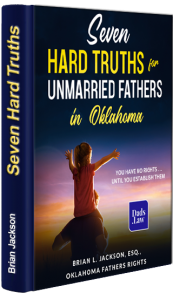Hearsay Means a Statement Repeated by a Third Party
Video Transcribed: What is the child hearsay exception under Oklahoma law? My name is Brian L. Jackson. I am an Oklahoma father’s rights attorney here with dads.law, today, we’re going to talk a little bit about child hearsay exceptions under the evidence code and under Title 12.
To start with, just so we are all on the same page, I want to talk to you about what hearsay is and what it’s not. What hearsay is, legally, means that you are repeating a statement by a third party who is made out of court by a third party, who is not present in the courtroom, that is being presented for the truth of the matter. A lot of people think hearsay means just witness testimony in general.
That’s not what it means. Hearsay is talking about some statement of fact that was made out of court by some third party that’s not being called as a witness, and somebody else is testifying to what that third party said.
 So in other words, the witness testifying didn’t perceive whatever that fact was with their five senses. That’s what hearsay is. Now generally, unless it falls into certain exceptions, hearsay is not admissible into evidence, as far as testimony goes.
So in other words, the witness testifying didn’t perceive whatever that fact was with their five senses. That’s what hearsay is. Now generally, unless it falls into certain exceptions, hearsay is not admissible into evidence, as far as testimony goes.
Now, one exception that you come across from time to time when you do family litigation, or some types of criminal litigation, and some types of … and certainly, deprived cases is this rule called the child hearsay exception.
What it is basically, there are exceptions under the evidence code when you’re talking about a hearsay statement by a child about either physical or sexual abuse, where the statement generally has the appearance of being credible and is something that more than likely, the child would not be untruthful about, is kind of the nuts and bolts of it.
There are specific rules about when this applies. There’s a section under Title 12 that deals specifically with criminal and deprived cases. And when those types of statements are admissible would be by a young child, as a child under 13 years of age, and that rule only applies in criminal or a deprived cases.
But then there’s also a catch-hole rule under the statute. And that applies more generally in other situations such as the family court, or it can. And one of the first things about both rules is that you have to give the other party notice.
There’s the minimum amount of notice required prior to presenting that in court or it’s not admissible. Also, if the child is unavailable as a witness and there’s a whole discussion about what is considered available or not available. But generally, it means either they’re literally not available or the court’s ruled they can’t testify for some reason. Then you have to have corroborating evidence of some kind of statement.
This rule can be a little bit of a problem from a defensive standpoint because it means things can be brought in where you otherwise might get an opportunity to confront that witness, or you wouldn’t get the opportunity to confront that witness.
And it makes it more difficult to defend against. But it is a rule that exists in Oklahoma law, and it’s something to be aware of. If you have questions about any of that, if you ever need a Tulsa child support attorney or a Men’s Child Custody Lawyer in Tulsa Ok, you can find one at Dads.Law.




